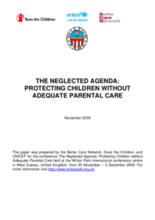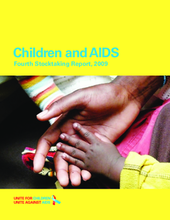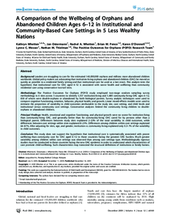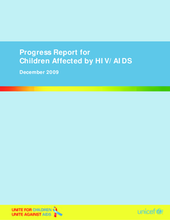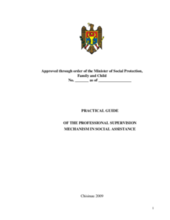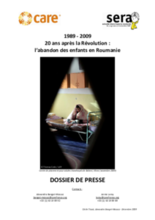Displaying 13421 - 13430 of 14579
Conference programme, background papers, key policy recommendation from 2009 Wilton Park conference event
Guidance for practitioners involved in child care reform, including direction on planning for de-institutionalization in parallel with community based services
Offers updates, authoritative data, evidence and recommendations on key areas including prevention of mother-to-child transmission, paediatric care and treatment, preventing infection among adolescents and young people, protection, care and support for children affected by HIV and AIDS, programme monitoring and evaluation.
Global policy makers are advocating that institution-living orphans and abandoned children (OAC) be moved as quickly as possible to a residential family setting and that institutional care be used as a last resort.
The latest in a series of reports produced by UNICEF on the status of orphans and vulnerable children (OVC). This is an easy-to-use reference document for policymakers and key stakeholders who work in the response for orphans and vulnerable children. It presents the 17 indicators described in the Guide to Monitoring and Evaluation of the National Response for Children Orphaned and Made Vulnerable by HIV/AIDS
As a result of the HIV/AIDS pandemic, there are now more than 12 million orphans in sub-Saharan Africa. The majority of these children have been absorbed into their extended families.
This scoping study assesses the nature and extent of the evidence base in relation to increasing the number of care leavers in ‘settled, safe accommodation’. The Social Care Institute for Excellence (SCIE) carried out the study on behalf of the Centre for Excellence and Outcomes in Children and Young People’s Services (C4EO), between November 2008 and February 2009.
This doctoral thesis by Hye-Young Lim examines the laws around the recognition of child-headed households in South Africa, particularly in the context of HIV/AIDS.
The Practical Guide of the Professional Supervision Mechanism in Social Assistance was developed in cooperation with the Ministry of Social Protection, Family and Child (Moldova), with the technical support of the "Support in the Deliver
Vingt ans ont passé depuis la Révolution de 1989, symbole de la chute du Conducator Nicolae Ceausescu. Pourtant, force est de constater que l’empreinte laissée par la politique pro-nataliste est toujours aussi forte. La Roumanie présente la spécificité d’être le seul pays où les abandons d'enfants aient été encouragés et organisés par l’Etat. Cette politique de Ceausescu poursuivait un triple objectif démographique, idéologique et politique.

